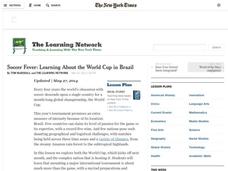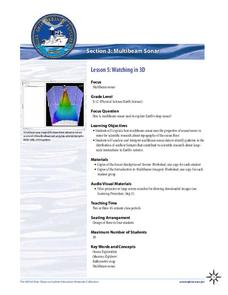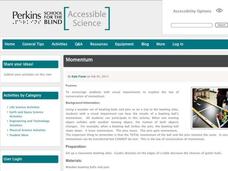Education World
Predicting Pumpkins
If you want more pumpkin seeds, you should get a bigger pumpkin—right? Young harvesters use estimation skills to make a hypothesis about how many seeds they will find in a pumpkin before examining the real number inside.
Teaching Tolerance
Artistic Expression Showcase
No one is too young to create a masterpiece. Elementary artists delve into the topic of social justice with original artwork. Scholars keep journals to reflect on their experiences before putting paintbrush to paper. Final artwork is...
The New York Times
Soccer Fever: Learning About the World Cup in Brazil
What an incredible collection of ideas for teaching about the 2014 World Cup in Brazil! This resource is packed with news articles and instructional activities on a wide variety of topics, from the global popularity of soccer and the...
EduGAINs
Making Savvy Consumer Choices
It's never too early to learn about grocery budgeting. Middle schoolers delve into the world of consumer math with a lesson that focuses on both healthy choices and real-world math applications. Groups work together to form a grocery...
Virginia Department of Education
Ecosystem Dynamics
Searching for an eccentric way to enhance lessons on ecosystems while ensuring pupils remain creative and motivated? Upon viewing The Lorax by Dr. Seuss, designated groups design and construct a pop-up book that depicts the specific ways...
Read Works
Trading Pumpkins
Can you imagine a pumpkin patch without pumpkins? Learners read how Tammy's family solves their problem in a cooperative way, followed by a set of 10 reading comprehension questions.
NOAA
Watching in 3D
Bring the ocean floor to life! Earth science scholars discover the process of deep sea mapping in the third installment in a series of five lessons about ocean exploration. The teacher's guide includes helpful resources, worksheets, and...
Agriculture in the Classroom
Build it Better
If you think you can do better, feel free to give it a try. Pupils learn about the work on Temple Grandin and consider ways to improve animal handling facilities. They work in groups to build models to showcase their ideas.
National Park Service
The Young Naturalist
Beginning with a brief history of our 26th president, Theodore Roosevelt, then followed by a discussion of his interest in nature, young scientists take to the outdoors to locate and observe local plants and insects. Scholars return to...
Perkins School for the Blind
Momentum
The laws of momentum can lead to fun! Learners with visual impairments use bowling pins and a bowling ball to model the law of conservation of momentum. They take turns bowling with differing degrees of force to explore how energy is...
English With Jennifer
Conversation Pieces: A Verb Tense Activity
Teach your English language learners about conversations by inviting them to participate in a conversation about an interesting object. Through this conversation, learners will naturally use various verb tenses and practice asking and...
Houghton Mifflin Harcourt
Voyagers: English Language Development Lessons (Theme 5)
This packet, the second in the series of support materials for the Houghton Mifflin Harcourt thematic units on voyagers, contains support and enrichment activities for ELD/ESL learners.
Houghton Mifflin Harcourt
Voyagers: Extra Support Lessons (Theme 5)
This packet, the third in the series of support materials for the Houghton Mifflin Harcourt thematic units on voyagers, contains activities for learners who may struggle with the basic concepts of the lessons. Included are lessons on how...
Virginia Department of Education
Work and Power
Assist your class with correctly calculating the values for force, work, and power as they determine the amount various activities require. They gather data and participate in a group discussion to compare results upon conclusion of the...
Virginia Department of Education
Electricity and Magnetism
Take charge of your class and provide them with an electrical experience! Individuals investigate the basic principles of electricity and magnetism by creating a model to test electric current and the amount of electricity generated....
University of California
You Are What You Eat: Testing for Organic Compounds in Foods
We have all heard that we are what you eat, but what are we eating? An informative lesson opens with a discussion of the foods pupils have recently eaten. Then, young scientists perform four experiments on seven different foods to...
Houghton Mifflin Harcourt
Around Town: Neighborhood and Community: Extra Support Lessons (Theme 3)
Neighborhood and community is the theme of a unit comprised of extra support lessons. Following practice pages and a teach, blend, guided practice, practice/apply routine, the series of lessons provide additional reinforcement of reading...
Pearson
Will for the Future; Future Time Markers
What will happen in the future? No one knows, but everyone can guess with the future tense! Young grammarians practice future time markers with a helpful presentation that focuses on air travel to space.
Scholastic
Lesson Three: The Earth, Movement in Space
If you feel like you're standing still, you're wrong! The Earth is constantly rotating and orbiting under our feet. Demonstrate the Earth's movement within the solar system with a collaborative activity. With a candle or lamp in the...
Institute of Electrical and Electronics Engineers
Smart Buildings and the Internet of Things
Is your building a smart building? Pupils learn what makes a building smart and about the internet of things. After viewing several videos on the topic, they conduct an activity collecting data from sensors and brainstorm ways to improve...
US Holocaust Museum
Remember the Children: Daniel’s Story
Imagine being a child forced from your home and into a concentration camp during World War II. Scholars prepare for a visit to the United States Holocaust Museum by researching the children of the horrible event. They analyze...
Smithsonian Institution
Water/Ways: The Poetry of Science
Water is the source of life. It appears in poetry in both peaceful and torrential descriptions; it appears in earth science in its liquid, gaseous, and solid states. Combine these interpretations of our planet's most precious and...
Florida Center for Reading Research
Comprehension: Monitoring for Understanding, What Do You Know?
An activity promotes reading comprehension. Readers analyze a text of their choice while activating prior knowledge and asking and answering questions. Scholars enforce multiple strategies to improve comprehension.
PBS
Reading Adventure Pack: Oceans
Flotsam by David Wiesner and The Magic School Bus on the Ocean Floor by Joanna Cole, illustrated by Bruce Degen, begin a reading adventure pack focusing on oceans. With story listening and thoughtful discussion, scholars complete several...
Other popular searches
- Vacation Planning
- Trip Planning
- Planning a Trip Itinerary
- Pre Trip Planning
- Math Planning a Trip
- Vacation Planning Budget
- Holiday Trip Planning
- Dream Vacation Planning
- Vacation Planning and Budget
- Vacation Trip Planning
- Planning a Trip Scrapbooks
- Trip Planning Outdoors

























